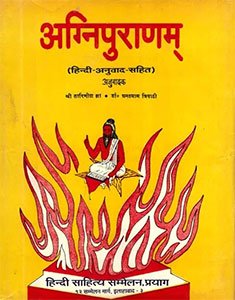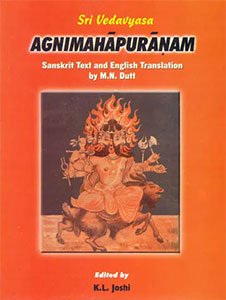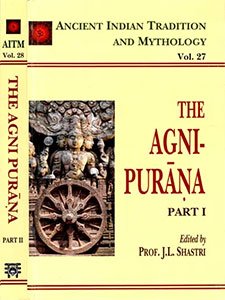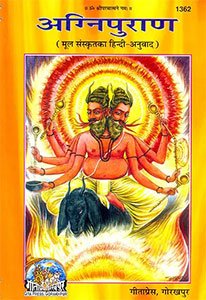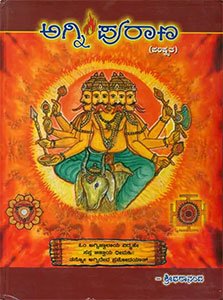Agni Purana [sanskrit]
97,288 words
This Sanskrit edition of the Agnipurana. It is one of the traditional eighteen Mahapuranas presented as an encyclopedia of ancient Indian history and knowledge. It contains either 382 or 383 chapters and over 10.000 verses (Sanskrit Shlokas).
Verse 73.2
सुदर्शन महाचक्र शान्त दुष्टभयङ्कर ।
च्छिन्द छिन्द भिन्द भिन्द विदारय विदारय ।
परमन्त्रान् ग्रस ग्रस भक्षय भक्षय भूतान् ।
त्रासय त्रासय हूं फट सुदशनाय नमः ।
अभ्यर्च्य चक्रं चानेन रणे दारयते रिपून् ॥ २ ॥
sudarśana mahācakra śānta duṣṭabhayaṅkara |
cchinda chinda bhinda bhinda vidāraya vidāraya |
paramantrān grasa grasa bhakṣaya bhakṣaya bhūtān |
trāsaya trāsaya hūṃ phaṭa sudaśanāya namaḥ |
abhyarcya cakraṃ cānena raṇe dārayate ripūn || 2 ||
The Sanskrit text of Verse 73.2 is contained in the book The Agni Puranam (Anandashram Edition) by Shri Chimna Apate (श्री चिमणा आपटे). This book is available online or you could buy the latest edition:
Read online Buy now! The Sanskrit text by Shri Chimna Apate (श्री चिमणा आपटे) (1987)
Glossary of Sanskrit terms
Note: This extracts Sanskrit terms and links to English definitions from the glossary, based on an experimental segmentation of verse (73.2). Some terms could be superfluous while some might not be mentioned. Click on the word to show English definitions.
Sudarshana, Mahacakra, Shanta, Dushta, Bhayankara, Vidara, Vid, Vida, Raya, Paramam, Tra, Grasa, Bhuta, Hum, Phata, Sudashana, Nama, Namas, Abhyarcya, Cakra, Rana, Darayat, Ripu,
Analysis of Sanskrit grammar
Note: this is an experimental feature and only shows the first possible analysis of the Sanskrit text (Verse 73.2). If the system was successful in segmenting the sentence, you will see of which words it is made up of, generally consisting of Nouns, Pronouns, Verbs, Participles and Indeclinables. Click on the link to show all possible derivations of the word.
- Line 1: “sudarśana mahācakra śānta duṣṭabhayaṅkara ”
- sudarśana -
-
sudarśana (noun, masculine)[compound], [vocative single]sudarśana (noun, neuter)[compound], [vocative single]
- mahācakra -
-
mahācakra (noun, masculine)[compound], [vocative single]mahācakra (noun, neuter)[compound], [vocative single]
- śānta -
-
śānta (noun, masculine)[compound], [vocative single]śānta (noun, neuter)[compound], [vocative single]√śam -> śānta (participle, masculine)[vocative single from √śam class 4 verb], [vocative single from √śam class 9 verb]√śam -> śānta (participle, neuter)[vocative single from √śam class 4 verb], [vocative single from √śam class 9 verb]
- duṣṭa -
-
duṣṭa (noun, masculine)[compound], [vocative single]duṣṭa (noun, neuter)[compound], [vocative single]
- bhayaṅkara -
-
bhayaṅkara (noun, masculine)[compound], [vocative single]bhayaṅkara (noun, neuter)[compound], [vocative single]
- Line 2: “cchinda chinda bhinda bhinda vidāraya vidāraya ”
- Cannot analyse cchinda*ch
- Cannot analyse chinda*bh
- Cannot analyse bhinda*bh
- Cannot analyse bhinda*vi
- vidāra -
-
vidāra (noun, masculine)[compound], [vocative single]
- ya -
-
- vidā -
-
vid (noun, masculine)[instrumental single]vid (noun, neuter)[instrumental single]vidā (noun, feminine)[nominative single]
- raya -
-
raya (noun, masculine)[compound], [vocative single]√ram -> raya (absolutive)[absolutive from √ram]√ray (verb class 1)[imperative active second single]
- Line 3: “paramantrān grasa grasa bhakṣaya bhakṣaya bhūtān ”
- paraman -
-
paramam (indeclinable)[indeclinable]
- trān -
-
tra (noun, masculine)[accusative plural]
- grasa -
-
grasa (noun, masculine)[compound], [vocative single]grasa (noun, neuter)[compound], [vocative single]√gras (verb class 1)[imperative active second single]
- grasa -
-
grasa (noun, masculine)[compound], [vocative single]grasa (noun, neuter)[compound], [vocative single]√gras (verb class 1)[imperative active second single]
- bhakṣaya -
-
√bhakṣ (verb class 10)[imperative active second single]√bhakṣ (verb class 0)[imperative active second single]
- bhakṣaya -
-
√bhakṣ (verb class 10)[imperative active second single]√bhakṣ (verb class 0)[imperative active second single]
- bhūtān -
-
bhūta (noun, masculine)[accusative plural]
- Line 4: “trāsaya trāsaya hūṃ phaṭa sudaśanāya namaḥ ”
- trāsaya -
-
√tras (verb class 0)[imperative active second single]
- trāsaya -
-
√tras (verb class 0)[imperative active second single]
- hūm -
-
hūm (indeclinable)[indeclinable]
- phaṭa -
-
phaṭa (noun, masculine)[compound], [vocative single]
- sudaśanāya -
-
sudaśana (noun, masculine)[dative single]sudaśana (noun, neuter)[dative single]
- namaḥ -
-
namas (noun, masculine)[compound], [vocative single]namas (noun, neuter)[compound], [nominative single], [vocative single], [accusative single]nama (noun, masculine)[nominative single]
- Line 5: “abhyarcya cakraṃ cānena raṇe dārayate ripūn ”
- abhyarcya -
-
abhyarcya (noun, masculine)[compound], [vocative single]abhyarcya (noun, neuter)[compound], [vocative single]
- cakram -
-
cakra (noun, masculine)[adverb], [accusative single]cakra (noun, neuter)[adverb], [nominative single], [accusative single]cakrā (noun, feminine)[adverb]
- cān -
-
ca (noun, masculine)[accusative plural]
- ena -
-
a (noun, masculine)[instrumental single]
- raṇe -
-
raṇa (noun, masculine)[locative single]raṇa (noun, neuter)[nominative dual], [vocative dual], [accusative dual], [locative single]
- dārayate -
-
√dṝ -> dārayat (participle, masculine)[dative single from √dṝ]√dṝ -> dārayat (participle, neuter)[dative single from √dṝ]√dṝ (verb class 0)[present middle third single]
- ripūn -
-
ripu (noun, masculine)[accusative plural]
Other editions:
Also see the following editions of the Sanskrit text or (alternative) English translations of the Verse 73.2
Agni Purana with Hindi Translation
by Tarinish Jha and Dr. Ghanshayam Tripathi (तारिणीश् झा और डॉ. घनश्याम त्रिपाठी) (2007)
Publisher: Hindi Sahitya Sammelan, Allahabad; 1199 pages; Title: अग्निपुराणम् (संस्कृत एवं हिन्दी अनुवाद);
Buy now!
Agni Purana (Two Volumes)
by M. N. Dutt (2023)
Publisher: Parimal Publication Pvt. Ltd.; Editor: K. L. Joshi.; ISBN-10: 8171101690; ISBN-13: 9788171101696; 1070 pages.
Buy now!
Agni-Purana (Set of 4 Volumes)
by N. Gangadharan (2006)
Publisher: Motilal Banarsidass Publishers Pvt. Ltd.; ISBN: Part I 8120803590 (9788120803596); Part II 8120803604 (9788120803602); Part III 8120801741 (9788120801745); Part IV 812080306X (9788120803060); 1271 pages.
Buy now!
The Agni Purana (Hindi)
by (2013)
Publisher: Gita Press, Gorakhpur; Title: अग्निपुराण (केवल हिन्दी अनुवाद); ISBN-10: 8129302934; ISBN-13: 9788129302939; 848 pages.
Buy now!
Agni Purana (Kannada)
by Sreedharananda (2013)
Publisher: Pooja Pusthaka Bhandara, Bangalore; Title: ಅಗ್ನಿ ಪುರಾಣ; 560 pages.
Buy now!Preview of verse 73.2 in Kannada sript:
ಸುದರ್ಶನ ಮಹಾಚಕ್ರ ಶಾನ್ತ ದುಷ್ಟಭಯಙ್ಕರ ।
ಚ್ಛಿನ್ದ ಛಿನ್ದ ಭಿನ್ದ ಭಿನ್ದ ವಿದಾರಯ ವಿದಾರಯ ।
ಪರಮನ್ತ್ರಾನ್ ಗ್ರಸ ಗ್ರಸ ಭಕ್ಷಯ ಭಕ್ಷಯ ಭೂತಾನ್ ।
ತ್ರಾಸಯ ತ್ರಾಸಯ ಹೂಂ ಫಟ ಸುದಶನಾಯ ನಮಃ ।
ಅಭ್ಯರ್ಚ್ಯ ಚಕ್ರಂ ಚಾನೇನ ರಣೇ ದಾರಯತೇ ರಿಪೂನ್ ॥ ೨ ॥
![Agni Purana [sanskrit] - book cover](/uploads/a/Agni-Purana-Sanskrit.jpg)
